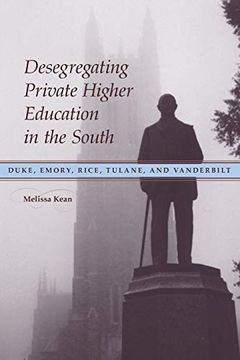Share
Desegregating Private Higher Education in the South: Duke, Emory, Rice, Tulane, and Vanderbilt
Melissa Kean
(Author)
·
LSU Press
· Paperback
Desegregating Private Higher Education in the South: Duke, Emory, Rice, Tulane, and Vanderbilt - Kean, Melissa
Choose the list to add your product or create one New List
✓ Product added successfully to the Wishlist.
Go to My Wishlists
Origin: U.S.A.
(Import costs included in the price)
It will be shipped from our warehouse between
Wednesday, June 12 and
Friday, June 28.
You will receive it anywhere in United Kingdom between 1 and 3 business days after shipment.
Synopsis "Desegregating Private Higher Education in the South: Duke, Emory, Rice, Tulane, and Vanderbilt"
After World War II, elite private universities in the South faced growing calls for desegregation. Though, unlike their peer public institutions, no federal court ordered these schools to admit black students and no troops arrived to protect access to the schools, to suggest that desegregation at these universities took place voluntarily would be misleading In Desegregating Private Higher Education in the South, Melissa Kean explores how leaders at five of the region's most prestigious private universities -- Duke, Emory, Rice, Tulane, and Vanderbilt -- sought to strengthen their national position and reputation while simultaneously answering the increasing pressure to end segregation.To join the upper echelon of U. S. universities, these schools required increased federal and northern philanthropic funding. Clearly, to receive this funding, schools had to eliminate segregation, and so a rift appeared within the leadership of the schools. University presidents generally favored making careful accommodations in their racial policies for the sake of academic improvement, but universities' boards of trustees -- the presidents' main opponents -- served as the final decision-makers on university policy. Board members--usually comprised of professional, white, male alumni--reacted strongly to threats against southern white authority and resisted determinedly any outside attempts to impose desegregation.The grassroots civil rights movement created a national crisis of conscience that led many individuals and institutions vital to the universities' survival to insist on desegregation. The schools felt enormous pressure to end discrimination as northern foundations withheld funding, accrediting bodies and professional academic associations denied membership, divinity students and professors chose to study and teach elsewhere, and alumni withheld contributions. The Brown v. Board of Education decision in 1954 gave the desegregation debate a sense of urgency and also inflamed tensions -- which continued to mount into the early 1960s. These tensions and the boards' resistance to change created an atmosphere of crisis that badly eroded their cherished role as southern leaders. When faced with the choice between institutional viability and segregation, Kean explains, they gracelessly relented, refusing to the end to admit they had been pressured by outside forces.Shedding new light on a rare, unexamined facet of the civil rights movement, Desegregating Private Higher Education in the South fills a gap in the history of the academy.

